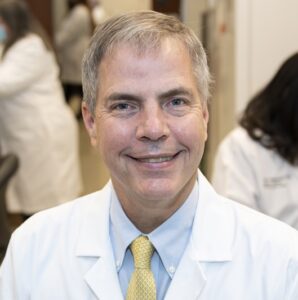The University of Pittsburgh School of Medicine is celebrating a monumental achievement with the election of three distinguished faculty members to the National Academy of Medicine (NAM) 2025 class. This honor is one of the highest possible accolades in health and medicine, solidifying Pitt’s reputation for leadership in biomedical research, clinical innovation, and global health impact. These new inductees join a distinguished group of researchers and instructors dedicated to discovering life-changing medicine around the world.
Dr. Terence S. Dermody: Advancing Viral Pathogenesis


Dr. Terence S. Dermody
Dr. Dermody, Vira I. Heinz Distinguished Professor and Chair of Pediatrics, has been recognized for his transformative discoveries in viral replication and pathogenesis. His pioneering research uses a common bug called reovirus as a model to study other dangerous germs, specifically RNA viruses. This has helped identify how viruses get into our body’s cells and spread, sometimes leading to the brain and spinal cord. Understanding this process is the first step toward stopping them.
Dr. Dermody also leads the local community program, The Pittsburgh Study, which focuses on improving the overall health and well-being of children in the region.
Dr. Kate Rubins: Extending Molecular Biology into New Frontiers


Dr. Kate Rubins
Dr. Rubins, a former NASA astronaut and professor of computational and systems biology, brings unique expertise spanning genomics, infectious disease and human spaceflight. She was honored for leading the development of modern molecular and cellular biology methods for use in low-Earth orbit and low-resource environments. Her achievements are highlighted by conducting the first successful DNA sequencing in space and pioneering crucial methods for studying viral diseases, such as mpox and Ebola, during critical fieldwork in Africa.
Dr. John C. Byrd: Revolutionizing Cancer Treatment
Dr. Byrd, incoming director of UPMC Hillman Cancer Center, was elected for his critical research demonstrating non-oncogene addiction as an effective strategy against cancer. His groundbreaking work centers on the preclinical and clinical development of Bruton’s Tyrosine Kinase (BTK) inhibitors. BTK is a protein that certain blood cancers, such as


Dr. John C. Byrd
Chronic Lymphocytic Leukemia (CLL), are addicted to for growth and survival; the inhibitors are drugs designed to turn off that protein, effectively cutting the cancer cell’s lifeline.
This innovation successfully transformed CLL from a fatal diagnosis into a manageable, chronic condition where patients can achieve a near-natural life expectancy, marking a profound therapeutic shift in modern oncology.
Pitt and UPMC proudly congratulate these three dynamic leaders for their extraordinary and impactful contributions, which reinforce the institution’s global role in advancing human health.

